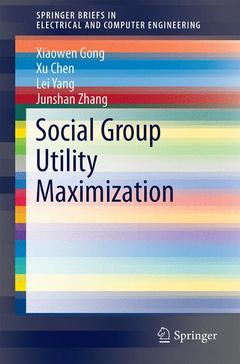Description
Social Group Utility Maximization, 2014
SpringerBriefs in Electrical and Computer Engineering Series
Authors: Gong Xiaowen, Chen Xu, Yang Lei, Zhang Junshan
Language: English
Subject for Social Group Utility Maximization:
Approximative price 52.74 €
In Print (Delivery period: 15 days).
Add to cart
Publication date: 12-2014
59 p. · 15.5x23.5 cm · Paperback
59 p. · 15.5x23.5 cm · Paperback
Description
/li>Contents
/li>Comment
/li>
This SpringerBrief explains how to leverage mobile users' social relationships to improve the interactions of mobile devices in mobile networks. It develops a social group utility maximization (SGUM) framework that captures diverse social ties of mobile users and diverse physical coupling of mobile devices. Key topics include random access control, power control, spectrum access, and location privacy. This brief also investigates SGUM-based power control game and random access control game, for which it establishes the socially-aware Nash equilibrium (SNE). It then examines the critical SGUM-based spectrum access game, and pseudonym change game for personalized location privacy. The authors propose future work on extending the SGUM framework to negative social ties, to demonstrate relevance to security applications and span the continuum between zero-sum game (ZSG) and non-cooperative game (NCG). Social Group Utility Maximization targets researchers and professionals working on mobile networks and social networks. Advanced-level students in electrical engineering and computer science will also find this material useful for their related courses.
Introduction.- Social Group Utility Maximization Framework.- SGUM-based Random Access Control and Power Control.- SGUM-based Database Assisted Spectrum Access.- SGUM-based Pseudonym Change for Personalized Location Privacy.- Conclusion and Future Work.
Includes supplementary material: sn.pub/extras
© 2024 LAVOISIER S.A.S.




